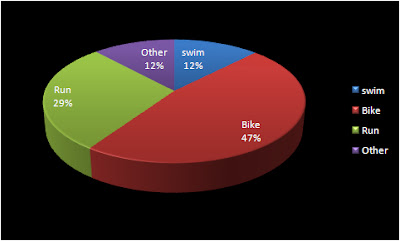Firstly a bit on what I am talking about, a GOAL is a broad statement of what we want to accomplish, in my world this year my GOAL is to race an Ironman PB in Regensburg in Germany this summer and finish before the clock turns 13hours.
To get there I am setting a number of interim OBJECTIVES to achieve this GOAL (which I will come onto in a moment)
ACTIVITIES are the actual things I do in working towards the OBJECTIVES, but it also needs to be noted that OBJECTIVES are not just a bunch of ACTIVITIES, they actually need to challenge in a way that they will help achieve the overall GOAL.
So far I have had a couple interim OBJECTIVES each one month in duration …
THE FIRST was to loose weight, I was weighing in at over 210lbwhich is to heavy for me, so my first objective was to loose weigh, to get back to around 200lb and into a ‘teen’ body fat, this will aid my overall objective by being lighter and in better condition when I race, lighter for the hill climbs and hopefully faster on the bike, Activities for this task involved keeping a food diary, replacing various foods for healthier alternative and training in a way to aid fat loss but maintain muscle
THE SECOND and current, is to improve my consistency in training, and although this is contentious I decided to aim to train every day this month, to use active recovery instead of rest, ensure I slept correctly, maintain a health diet and monitor key indicators of training/overtraining within my body. In the past I have often been guilty of not being consistent enough in training and therefore this kick up the backside will help deliver a more solid base to this years training and therefore i'll be in a better place when i start the build.
NEXT month the objective will be run based, as my Ironman Marathons in the past have always been well below my actual marathon capabilities and I am looking to fix that, I am not sure on the nature of the objective(s) yet, but watch this space
To achieve the GOAL, we need both resolute and flexible. When difficulties and unexpected problems present we need to HTFU and JFDI (see post)and stick to our goals. But always stay flexible with your objectives and activities. If the way you do things now does not work, try another way. Keep trying until you find the one that works.
This approach is probably not for everyone …but I am giving it a go
WW



